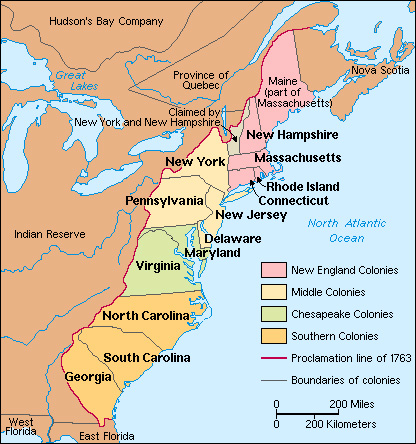Proclamation of 1763 was a document issued by King George III of England that prohibited American colonial settlement west of the Appalachian Mountains. Native Americans had claimed these lands, and Britain hoped to avoid costly Indian wars. The proclamation was one of a series of British government actions that fostered resentment among the colonists. The proclamation also established the colonial governments of Quebec, East Florida, and West Florida, and of Grenada in the Caribbean Sea. The proclamation’s statements recognizing the legal rights of Native American peoples later influenced the governmental policies of both the United States and Canada.

Background.
In the French and Indian War (1754-1763), British, French, and Native American combatants clashed over territory in North America. Following a string of British victories, American colonists pushed into the western frontier. British authorities feared that American settlement would increase hostilities with Native Americans. In late 1761, the Board of Trade, an advisory body within the British government, restricted the power of local authorities to issue land grants. Still, American settlement continued.
In February 1763, the Treaty of Paris gave Britain most of France’s territory in North America. The land stretched from the Appalachians in the east to the Mississippi River in the west. An increase in colonial settlement, along with complaints over trade practices, generated distrust among the region’s indigenous (native) residents. Britain kept a permanent armed force in the colonies to maintain order. The force aimed to occupy former French outposts, regulate trade with Native Americans, and enforce restrictions on frontier settlement.
In May, the Ottawa chief Pontiac led an alliance of several Native American groups against the British fort at what is now Detroit. His actions also sparked attacks by other indigenous groups, who razed frontier settlements and captured a number of British forts. The conflict continued through late 1764. See Pontiac’s War .
The proclamation and its effects.
On Oct. 7, 1763, King George III, hoping to prevent future uprisings, issued a proclamation barring white settlement on indigenous hunting lands. The proclamation forbade British officials from granting titles to “any lands beyond the heads or sources of any of the rivers which fall into the Atlantic Ocean from the west or north-west; or upon any lands whatever, which not having been ceded to, or purchased by us, as aforesaid, are reserved to the said Indians….” The proclamation prohibited anyone other than authorized royal representatives from making any future land purchases from Native Americans.
Would-be settlers and land speculators resented the restrictions. Many colonists simply ignored them. Furthermore, many Americans objected to the presence of British troops trying to enforce the proclamation.
In 1764, the British Parliament passed the Sugar Act . The act implemented a tax on molasses to help pay for the stationing of troops. Many colonists insisted that Britain had no right to tax the Americans if the Americans had no representation in Parliament. Protests over “taxation without representation” helped set the stage for the American Revolution (1775-1783).
See also American Revolution ; French and Indian wars ; Westward movement in America .
